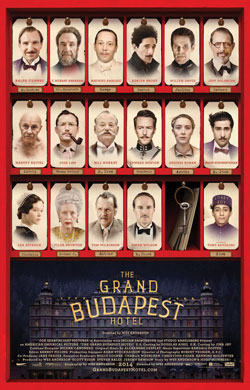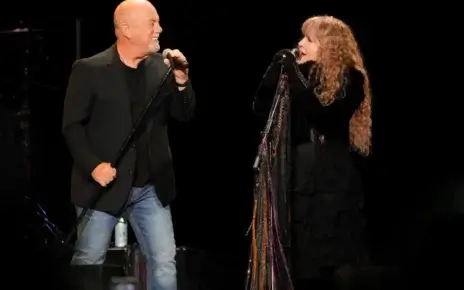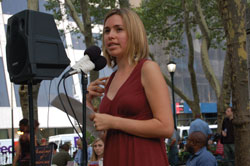The films of director Wes Anderson have always had a sort of architectural sense to them, with every minute detail, from the dialogue to the music to the stance and position a character is standing in a shot, being meticulously crafted and constructed as a small piece of a greater, more elaborate whole.
With this logic, one would imagine “The Grand Budapest Hotel,” Anderson’s latest, to be his most baroque-like and grandiose construction yet, and not just for the lavish model of the hotel appearing through the film. From its dense, fast-paced plot to its lavish, gorgeous cinematography and art design, every facet of “The Grand Budapest Hotel” is crafted with extreme precision detail, but is bursting with enough heart and personality to make it all seem effortless and fun.
Set in the fictitious Eastern European nation of Zubrowka, where the enormous Grand Budapest resides, the film tells stories within stories in order to uncover the history of the fictional hotel and the characters that ran it. Set initially in the 1960’s with the hotel in decline, the film starts with a writer – known only as “The Writer” (Jude Law) – who writes a book about The Grand Budapest, based mainly on a conversation he had with Zero Mustafa (F. Murray Abraham), the hotel’s then-owner, while staying their one evening.
At this point, the older Zero (who’s younger self is played by Tony Revolori) tells his story about his experiences there as a lobby boy working under the guidance of concierge Monsieur Gustav H. (Ralph Fiennes) in 1932, which makes up the bulk of the film’s narrative. From here, we are taken through Zero’s perplexing tale of an old lady’s will, a priceless painting, prison breakouts, an oppressive, intimidating army, and more, all with the purpose of explaining how Zero ended up owning the once renowned hotel.
The story might seem convoluted, and definitely encourages multiple viewings to pick up on the details, but everything glides along at such a brisk, energetic pace and is loaded with so much freaking charm and wit that it’s hard not to watch the film without smiling continuously, even when dealing with such heavy themes as military oppression and loneliness.
This mostly has to do with the film’s colorful, often ridiculous characters, which “The Grand Budapest Hotel” has in spades. Anderson has always had a gift when it comes to crafting nuanced, memorable characters, but never has one film of his had so many all at once.
The all-star cast certainly helps, with Anderson’s regulars (Jason Schwartzman, Bill Murray, Owen Wilson) making memorable cameos alongside that of Adrien Brody, Edward Norton, Jeff Goldblum, and more, but the director’s imagination for odd personalities, from a grizzled, brass-knuckled hitman (Willem Dafoe) to a black-clad, tyrant of an heir (Brody), should not be unaccounted for.
The undeniable showstopper, however, is Fiennes as M. Gustav, who might be the single-greatest character Anderson has created (and that’s saying something in a filmography of Max Fishers and Royal Tenanbaums). Poised, elegant, and “well-perfumed,” the English concierge of the Grand Budapest is a marvel to watch on screen, spouting endlessly witty dialogue on his love of poetry and old ladies while constantly striving to keep everything fabulous. However, the man is still not above fighting a man in prison merely to prove he’s not a wimp, only to befriend the guy right after.
Gustav might be at his best, though, when paired with the young, wide-eyed Zero, who is played with a dry, stone-faced charm by newcomer Revolori. Gustav may do the bulk of the talking when the two are together (as he should, given the constant brilliance he spews out), but you really get a great sense of the warmth and friendship the two develop through their adventure, as Zero is often seen mimicking Gustav’s actions while Gustav grows more and more respectful of the diminutive lobby boy the more he comes out of his shell.
Though performances and characters shine throughout “The Grand Budapest Hotel,” one cannot underestimate the brilliance the film shows in its art design and cinematography. Anderson has always been known for the intense attention to detail he puts into his elaborate, symmetrical shots, and “The Grand Budapest Hotel” does this on speed. Even the simplest scenes in the film, from characters riding an elevator to Gustav reading aloud a letter from prison, are so acutely poised and structured they seem more like living tableaux’s than natural actions.
Anderson also utilizes some fun and impressive camera work within many scenes throughout the film to give these living paintings he crafts even more depth and personality than they do naturally. Scenes involving Zero sprinting on a rooftop – running off camera one way and coming back another in the background in the same shot – and a man pulling what looks like one small ladder off a wall, only to see it’s one huge ladder carried by five men as it crosses the shot, are deeply elaborate and meticulous, but come off more as amusing gags that help color the film even further.
Speaking of color, it’s impossible to ignore that – aside from the camera work and shot compositions – the film is just artistically beautiful in its set designs. This is especially true with The Grand Budapest itself, which is filled with lavish decorations and glows with bright reds, yellows, and purples. Costume design should also not be ignored, as the bold purples and yellows of the hotel uniforms not only stand out, but feel somewhat appropriate of the early 20th century time period.
One of my only true gripes with the film is its length, as it feels like it somewhat stops short at only an hour and a half. The film does a good job at not leaving too many loose threads, but I still would have liked to have seen more of Gustav and Zero by the film’s end.
Anderson’s reputation as a strict auteur has always worked for and against him, with some loving his totally distinct style while others feeling his tricks have become predictable. “The Grand Budapest Hotel” is no less true to the Wes Anderson formula but pulls everything together with so much depth and imagination that it feels totally unique regardless. It will easily stand as one of his “grandest” statements.
PHOTO TAKEN from collider.com




